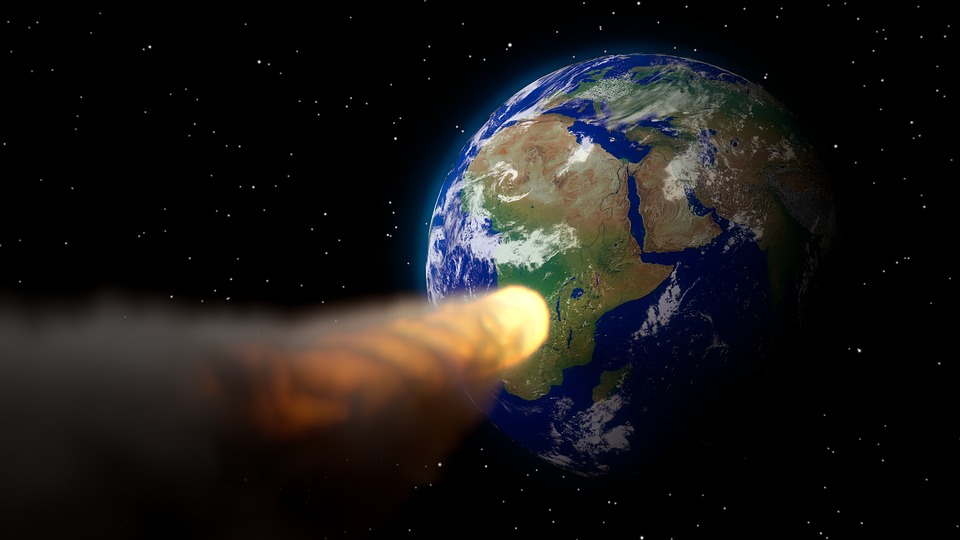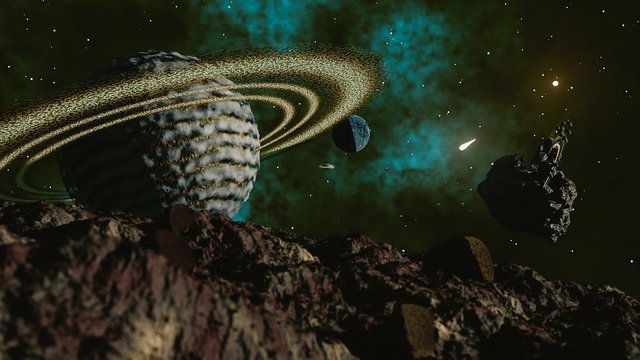What is the likelihood that a comet will strike the earth? What is the best way to detect and stop this?
A comet, or scientifically known as a ‘’dirty snowball’’, is a snowball, who is filled with frozen gases, and dust. This ball also has the usual ‘’habit’’ to fly into the cosmos on the way to the Sun. The interesting thing, is that when an icy object like a comet gets closer enough to ‘’wing’’ around the Sun, then his ice warms up , and becomes a dust. In that moment, the comet gives ‘’birth’’ to a glowing hot cloud, called a coma. Furthermore, concerning the comet’s origin, and how she was formed, there are some astronomers, who believe that comets are actually the leftovers of stars and planets that existed 4.6 billion years ago. As well, there are also researchers, who claim that comets might also have been the original carriers of water , organic molecules, and compounds to Earth. Nowadays, they are also familiar as the building blocks of our solar system, and the life we have here on Earth. But, regardless of how comets were created ,and whether they were actually the ‘’shippers’’ of water , and molecules , they still exist , and for that reason the Earth could suffer from damages on a global scale. So, the question that ‘’arises’’ is: Should we be worried that a comet , or an asteroid could hit the earth in the near future?
According to NASA , on June 24 , 2017, a very close ,,meeting’’ occurred between our Earth and a big space rock. Luckily, they say that this gigantic rock , also known as an asteroid, carefully passed by , otherwise it would have caused a massive ,,wipe-out’’ of all humanity , and living species here on Earth. But , even though one asteroid is ,,out of the way’’ experts fear that the next one called Apophis, who is going to hit the Earth on April 12, 2029 , and then again on April 13 , 2036 , is expected to “change [the orbit] in a way that is not fully predictable”. Tragically, if this 370 meters long rock happens to hit the Earth , scientists estimate that it would create an explosion, that will be 65,000 times more powerful of the nuclear bomb, that was dropped on Hiroshima.

ImgCredits – pixabay.com
So , how should we stop this ,,nightmare’’ of blowing up the Earth ? Are we aware enough that we could never be able to ,,wake up’’ again?
As NASA warned: ‘’It is not a matter of if – but when we will be forced to deal with an asteroid slamming into the Earth’s surface’’. They and the European Space Agency have gathered their own ,,forces’’ in ,,fighting this battle’’ . Crashing with a spaceship into an asteroid, and triggering a kinetic impact , is their mission to ,,save the world’’. In this proposed space operation they want to use two spacecraft. The first one will be launched by the European Space Agency in 2020 , and the second one by NASA in 2021 year. The primary goal is to see whether it is possible to change the direction of the flying asteroid, and to turn it away from the straight course, or to deflect it. But , in doing that , they alert us that there is an enormous risk of breaking the fragments, and causing the asteroid to speed up his flight straight to the Earth. In view of that, the mission still doesn’t have the ,,green light’’ for its approval, or confirmation for her funding.
Furthermore , besides deflection as one of the proposed mitigation techniques, scientists also confirmed four more methods to stop the ,,killer’’ asteroid from getting ,,too close’’ to our precious Earth. They are :
Track and Characterize
There are a lot of flying objects in the orbit. Some of them are ,,hostile’’ and life threatening. But, some of them are not. Therefore, we need to take cautious telescopic observations for a couple of months , even years , before we could convincingly say : ‘’Yes , this asteroid is going to hit us! ‘’ . Otherwise the target object will be lost, and the sphere, or the path where it is rotating can be a real challenge for figuring out where the object is ‘’hiding’’. Once we succeed to find the asteroid, we need to characterize him based on his physical properties , composition , and spin rate. This is in case we need to deflect him. These two steps are necessary for better understanding the asteroid, and comets population, because asteroids, are highly variable , and they could influence the entire mission of deflecting it.
Nuclear weapons
Although, nuclear weapons are still the most destructive weapon that humanity has ever developed, the ,,sweet’’ irony is that they could be a ,,live saver’’ in this situation. Detonating it near the comet , or asteroid , and use the heat from the explosion to accelerate the comet in opposite direction, as we mentioned before , could deflect the asteroid away from the Earth. But , then again we can’t be a hundred percent sure of the consistency in these objects, and how they are held together, so some scientists believe that even a small nuclear weapon can accidently shatter, rather than deflect the comet from the Earth. Therefore, they recommend that it will be very useful if we already know about the consistency of a comet or meteor , before using nuclear weapons.
Solar radiation
Pushing off the space rock from the Earth , can be an ,,obligation’’ from our Sun too. The sun energy, or as astronomers like to call it a radiation, is an electromagnetic energy , that travels through space, and could put enough pressure to drive away any object in the solar system. This ,,sun pressure’’ could be generated by ,,belting’’ a sails onto the spacecraft, and letting them feel a wave of high energy – x rays , so that the vessel will slowly speed up , and steer away any objects closer to Ea
Gravitational Tractor
Every object in the universe has gravity. But , two objects can ‘’share’’ a gravitational attraction. How? Well , when they are flying in the same direction , and ‘’feel’’ that they are being pulled close to each other , then we say they create a gravity magnet , or gravitational attraction. "We had looked at landing on the surface [of an asteroid] and all the problems associated with that, when we found that the gravitational force is about equal to the force that you plan to be pushing with anyhow," according to Lu , an astronomer. He also explained : "You would use this small gravity force between the [spacecraft and the asteroid] as your towline to basically pull this thing," And so , Lu , and the other astronomers consider that gravitational tractor is a viable solution, but as long as they are aware of the potential collision in the future.

ImgCredits – pixabay.com
Concluding Thoughts
Even though, there is a huge possibility that in the near future a comet, or asteroid will hit the Earth , still we shouldn’t lose hope. Instead we should face this bravely, and look at the bigger picture. We are aware that our planet earth is extremely ‘’vulnerable’’ at this time. It is all because of her ,,painful’’ past of outside impacts , and space influences. However, a lot of technological resources are on our disposal, and if we try to use it wisely and productively , then we can ensure humanity won’t suffer the same tragic fate as dinosaurs did 66 million years ago. The truth is that everything depends on us. Everything depends on our commitment. Everything depends on our effort. And, at the end everything depends on our willingness to save humanity.
Refferences :
Andrew Follett , (2017) , ‘’Scientists Have Predicted When Earth Will Be Hit By An Extinction-Level Asteroid’’ , http://dailycaller.com/2017/06/24/scientists-have-predicted-when-earth-will-be-hit-by-an-extinction-level-asteroid/
Sara Kamouni , Mark Hodge (2017), ‘’What are asteroids, could a meteor strike destroy Earth and when will the next one hit the planet?’’ https://www.thesun.co.uk/news/2134173/asteroids-meteor-strike-earth-next-impact-planet-2017/
Bruce Betts, (2015), ‘’Five steps to prevent asteroid impacts’’ , http://www.planetary.org/blogs/bruce-betts/2015/0630-5-steps-to-preventing-asteroid-impact.html
Robert Lamb, (2017), ‘’Could we stop an asteroid on a collision course toward Earth?’’ , http://science.howstuffworks.com/stop-an-asteroid.htm
Nina Burleigh , (2015), ‘’How to stop an asteroid hitting Earth: Would people co-operate to face a global peril?’’ , http://www.independent.co.uk/news/science/how-to-stop-an-asteroid-hitting-earth-would-people-cooperate-to-face-a-global-peril-10353951.html
Margi Murphy, (2017), ‘’Nasa to smash spaceship into asteroid as part of emergency rehearsal mission to save mankind’’ , https://www.thesun.co.uk/news/3168651/nasa-to-smash-spaceship-into-an-asteroid-as-part-of-an-emergency-apocalyptic-space-rock-mission/
Greg Uyeno , (2016), ‘’What Would Happen If Comet Swift-Tuttle Hit the Earth?’’ , https://www.livescience.com/55484-swift-tuttle-collision-with-earth.html